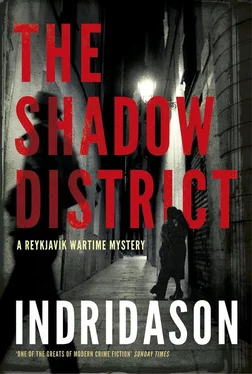‘I’ve never had a girlfriend,’ said Jónatan.
‘What about Hrund?’
‘What about her?’
‘Did you have a crush on her?’
‘No,’ said Jónatan. ‘I hardly knew her.’
‘Did she go running after the soldiers up north?’
‘Not that I could see.’
‘Did you assault Hrund?’
‘No, I didn’t.’
‘Did she turn you down?’
‘Turn me down?’
‘We mentioned Rósamunda yesterday,’ said Thorson.
‘Yes.’
‘You claim you didn’t know her.’
‘I didn’t.’
‘And you had no idea where she worked?’
‘No.’
‘Tell me, what do you do if your clothes need mending?’
Jónatan was confused by the question. ‘I... what do I do?’
‘If you tore a hole in your trousers, for example. Or needed to get the elbows of your jumpers patched. Are you good with a needle and thread yourself?’
Jónatan looked wonderingly from Flóvent to Thorson and back. ‘Why... why are you asking me that?’
‘You’re not much cop at sewing, are you?’ said Flóvent.
‘No.’
‘Rósamunda worked for a dressmaker’s in Reykjavík. The shop also offers a mending service. It’s called The Stitch. Does that jog your memory?’
‘I took my trousers to be mended once,’ Jónatan faltered.
‘Did you take them to that company, to The Stitch?’
‘It’s possible.’
‘Possible?’
‘Yes.’
‘Perhaps this will refresh your memory.’
Flóvent took out the invoice they had found in Jónatan’s digs and placed it on the table in front of him. It bore the stamp of The Stitch and listed a fee for repairs made to one pair of trousers. Jónatan reached for the invoice, but Thorson was quicker off the mark and, snatching the piece of paper, held it up to him.
‘Yes, that’s right.’
‘Were you aware that Rósamunda worked for this company?’
‘I don’t know any Rósamunda. I don’t understand why you’re holding me here. I’ve done nothing wrong. All I want is for this to be over.’
‘It might be advisable for you to get yourself a lawyer at this stage,’ said Flóvent.
‘I don’t want a lawyer. I don’t know any lawyers. I want to go home. I haven’t got time for this. You have to understand — I’m innocent. I haven’t done anything. You’ve got to believe me.’ Jónatan stood up. ‘You can’t keep me here. You’ve no right to hold me. I’m leaving.’
By now Flóvent and Thorson were also on their feet. Jónatan walked to the door, which was unlocked. He opened it and was about to step out into the corridor when Thorson grabbed his arm.
‘Let me go.’
‘I’m afraid you can’t leave yet,’ said Flóvent.
For an instant it looked as if Jónatan was going to try to make a break for it. Then, conscious that he was outnumbered, he seemed to wilt.
‘Don’t do this to me,’ he begged. ‘Let me go.’
‘I’m sorry, son,’ said Flóvent. ‘I’m arresting you on suspicion of murdering Rósamunda. We have no alternative. I advise you to cooperate and also strongly recommend that you get yourself a lawyer.’
An hour later Flóvent was back in his office on Fríkirkjuvegur, poring over the notes he had found in Jónatan’s room. They consisted of an account the student had scribbled down over five sides of paper. The handwriting was barely legible yet Flóvent thought he could make out the gist. Pulling over the desk lamp, he shone it on the pages. They were unnumbered, so it took him a while to figure out what order to read them in. The style was familiar from the old court records he had occasionally consulted, and before long he had worked out that the pages described a nineteenth-century rape case. The more Flóvent was able to decipher, the more convinced he became that he had the right man in custody.
Konrád pushed one drawer of the filing cabinet shut and opened the next. He hadn’t entirely given up hope of finding a police report on Rósamunda’s death. The fragment of the witness statement, from which he’d learnt Ingiborg’s name, had turned up in an otherwise empty folder, marked only with a case number and filed under 1944. After sifting through everything he could find in the archives for that year without success, he tried widening his search to include files from the years immediately preceding and following 1944, in case any documents had been misplaced. The police must have written reports about such a major crime; he was convinced of it. It was simply a matter of finding them.
His thoughts kept returning to Petra’s description of the elderly Thorson’s agitation on learning that Rósamunda had been afraid of entering a certain house in Reykjavík. According to Petra’s mother, it had been the home of a prominent family: a member of parliament and his wife, pillars of society, important customers, in whose patronage the dressmaker had taken a snobbish pride. Oddfellows, and he might have been a Freemason, Petra had said. Since she had also passed on their names to Thorson, it was a fairly safe assumption that he must have attempted to approach the family, seventy years after the event.
‘I’m glad you came,’ Petra had told Konrád as he was leaving. ‘I hope I’ve been able to help. To be honest, my mother was terribly bothered about all this before she died. Plagued with guilt about withholding information.’
‘Surely there was no need for that,’ Konrád replied, not knowing what else to say.
‘She was afraid she’d unwittingly caused trouble for someone,’ said Petra, ‘but felt it was far too late to make amends. She was desperate to relieve her conscience. Do you think this Stefán — Thorson — could have been killed because of what she knew?’
‘Oh no, that’s very unlikely,’ Konrád said reassuringly, though privately he was beginning to wonder.
‘Or someone else could have suffered because she kept quiet? Though Mother didn’t think anyone had been arrested or tried for the murder.’
‘No, I can’t find any evidence of that either.’
‘Perhaps she should have told the whole truth.’
‘Presumably she was reluctant to report unfounded suspicions, as you said. She must have been in a real quandary.’
‘Do you think you’ll ever find out what happened?’
‘Who knows? It’s probably too late now.’
Konrád pulled out one file after another. As he flicked through their contents he kept an eye out for references to Rósamunda, Thorson or a student connected to the case. Every now and then he came across the name of the detective, Flóvent, who had been conducting the inquiry with Thorson, but never in connection with Rósamunda. Flóvent had investigated all kinds of routine offences: burglaries, smuggling, car thefts and cases of assault, as well as the odd serious incident, until his name disappeared from the records shortly after the war.
While Konrád was leafing through paperwork from the time of the occupation, he reflected on what he knew about the Situation. He had recently read a newspaper article about the prejudice that Icelandic women who had fraternised with soldiers had faced for many years after the war and the stigma attached to the children of such unions, though attitudes had gradually changed and softened with the passing of time and the influence of the feminist movement. According to the article, the war had effectively emancipated Icelandic women from the patriarchy of the old farming society. The unprecedented degree of independence they enjoyed was one reason why resentment about the Situation had been so fierce. After all, a woman who washed laundry for the army was an independent businesswoman with an income many times greater than that of her unskilled sisters. No longer subject to the traditional authority of the male householder, and spared the need to find herself a husband straight out of a turf hovel, she found herself free to indulge her desire for adventure, to sail to far-off lands with a man from another world on her arm. Besides, as the women themselves pointed out, the foreign soldiers — polite, personable and clean — seemed like fairy-tale princes compared to the Icelandic men on offer.
Читать дальше












